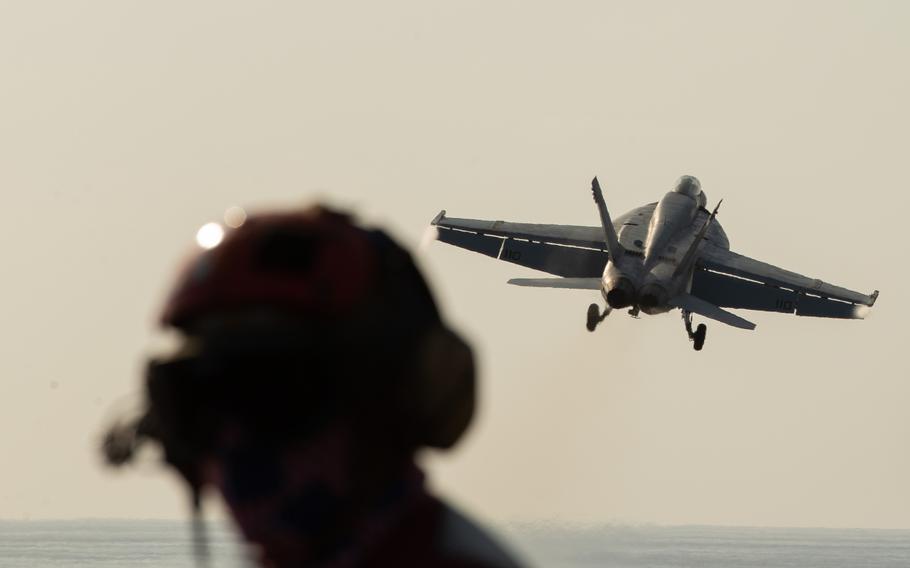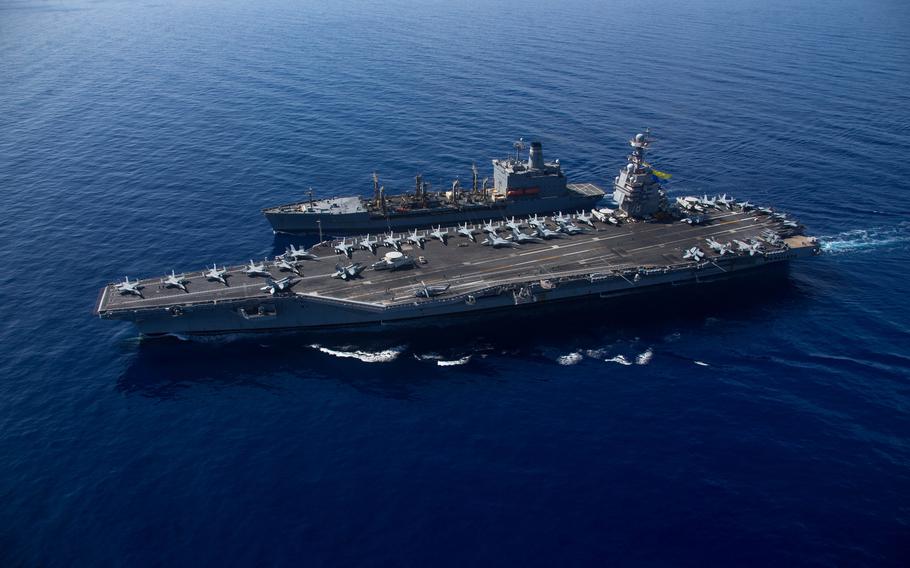
An F/A-18E Super Hornet launches from the flight deck of the USS Gerald R. Ford in the eastern Mediterranean Sea on Oct. 11, 2023. (Triniti Lersch/U.S. Navy)
WASHINGTON — Twelve senior military positions that help lead U.S. forces in the Middle East are caught in Sen. Tommy Tuberville’s hold on military nominees, and some lawmakers fear the understaffing will impact U.S. support to Israel.
The posts in U.S. Central Command, including the deputy commander and the commander of the Navy’s 5th Fleet, are either being held by temporary commanders, junior officers or officers doing two jobs at once, said Sen. Mark Kelly, D-Ariz.
“As we reposition our own forces and support our ally Israel with intelligence, logistics and other assistance, we need U.S. leadership to be as strong and focused as possible,” Kelly, a former naval aviator, said Thursday. “This hamstrings our regional military leadership during a crisis. Period.”
Kelly is the latest lawmaker to lash out at Tuberville, R-Ala., for retaining his hold on more than 300 general and flag officers as Israel goes to war against the Hamas-ruled Gaza Strip in retaliation for the deadliest attack on Israel in more than 50 years.
Tuberville instituted his block in February to push the Pentagon into dropping its abortion access policy for service members. He said Sunday that he will not back down even as the U.S. surges warships and aircraft to the Middle East to back up Israel and prevent the fighting from spiraling into a broader conflict.
“The holds are not affecting our military readiness and they are certainly not affecting the readiness of other countries,” Steven Stafford, Tuberville’s spokesman, said Thursday.
Stafford did not comment on whether Tuberville will try to force individual votes on any of the affected Central Command positions when the Senate returns from recess next week.
Tuberville’s attempt to bring the nomination of Gen. Eric Smith, the Marine Corps commandant, to a standalone vote last month prompted the Democrat-led Senate to confirm Smith and two other positions on the Joint Chiefs of Staff individually in a process that spread over two days. The Senate typically speeds through groups of military nominations via unanimous voice votes.
The Middle East-related positions affected by Tuberville’s hold include the CENTCOM deputy director for strategy, plans and policy, the deputy commander and reserve vice commander of U.S. Naval Forces in CENTCOM, the deputy commander of U.S. Air Forces Central, the commander of the 380th Air Expeditionary Wing, the commanding general of the I Marine Expeditionary Force, the commanding general of the 1st Sustainment Command, the assistant division commander of the 1st Marine Division and the defense attaches to Israel and Iraq, according to Kelly.
Jonathan Lord, director of the Middle East security program at the Center for a New American Security, a centrist Washington think tank with ties to the Pentagon, said the positions are all important for maintenance, logistics, readiness and sustainment of U.S. forces and for planning military operations.
“These are all critical roles on any given day, but with the U.S. supporting Israel in this moment of crisis with a whole host of possible contingencies that could stem from that, this is not the time to be understaffed,” he said.
John Kirby, the White House National Security Council spokesman, said Thursday that there are no plans to put American troops on the ground as Israel prepares a likely ground invasion of Gaza, where a handful of Americans are believed to be held hostage.

Aircraft carrier USS Gerald R. Ford steams alongside USNS Laramie during a fueling-at-sea in the eastern Mediterranean Sea, Oct. 11, 2023. (Jacob Mattingly/U.S. Navy)
But the U.S. military has shored up support for Israel in other ways, deploying the USS Gerald R. Ford carrier strike group to the Eastern Mediterranean a day after Hamas militants attacked Israel on Saturday. A second U.S. carrier strike group bound for the region is set to depart Friday from Norfolk, Va.
A small group of American special operations forces are also assisting Israel’s military with planning and intelligence, according to Defense Secretary Lloyd Austin.
Sen. Tammy Duckworth, D-Ill., said CENTCOM officers who should be helping the U.S. military response are “unable to do so as a result of Sen. Tuberville’s one-man political blockade.”
“It has never been clearer that he is singlehandedly threatening our military’s readiness and global stability,” Duckworth, a former Army helicopter pilot, said in a statement. “As has been true for months, he must lift his hold immediately so that our military can wield the full range of our nation’s capabilities as it works to support our Israeli allies.”
It is not clear if the Senate will act on any of the CENTCOM nominees next week, though Sen. Tim Kaine, D-Va., said pressure is mounting to break Tuberville’s hold. Two positions on the Joint Chiefs, the chief of naval operations and the Air Force chief of staff, are included in the stalled nominations.
“When we get back, I think you’re going to see this ice jam break and we’re going to start to confirm our military,” Kaine said this week in an MSNBC interview.
Lord, a former staff member for the House Armed Services Committee, said it will be difficult for the public to discern the effects of Tuberville’s hold on the Middle East though that does not mean the military is not having to navigate hurdles and obstacles as a result of the block.
“The U.S. military is going to overcome and adapt to provide everything it needs to our close partner Israel,” he said. “It is unclear to me that from the outside looking in, you’re going to see any deficiency, but that is a testament to the U.S. military and not to the unimportance of these holds and the damage that they’re doing to the processes and the leadership of the force.”